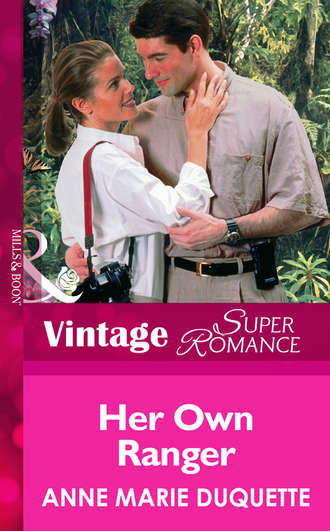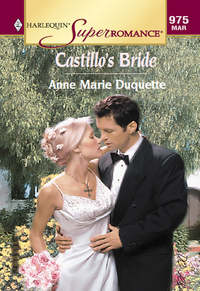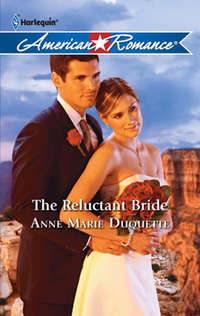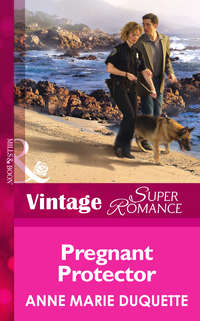
Полная версия
Her Own Ranger
“Just a thought that crossed my mind.”
“Keep it there. Please, Aunt.”
He flinched as the healer wrapped over a particularly painful spot. When the job was finished, Deborah brought him herbal tea with its painikilling and sleep-inducing properties.
“Drink it,” she urged.
“I will, but I need you to do something for me.”
“First drink the tea.”
Carson downed the drink and passed her the empty mug. “I want you to contact that woman. Alisha Jamison.”
Deborah looked puzzled. “Why?”
Carson moved his legs restlessly in the hammock. “You know, she’s that crusading Dian Fossey type. She and her partner—some guy Ray knows—have done those articles and TV shows that publicize poaching.”
“I know who she is. I’ve seen some of her documentaries and photographs. And the man’s name is Josh Gregory. I also remember you advised the tribe and the NPS to refuse them permission to enter our lands. You said her filming would disturb the hatchlings—and maybe interfere with the investigation of your father’s death.”
“Yeah, well, that was a year ago, and I thought I’d have caught Dad’s killers by now.”
“You’ve changed your mind?”
“Yes. She’s exposed poachers all over the world. She gets publicity for animals at risk and creates public awareness of the problem.” He paused. “Her work even led to the capture of some poachers—in Australia, I think.”
“But you said you were going to catch the poachers yourself.”
“I intend to. However, I need a distraction—a tactical diversion—while I’m doing it. Today’s was a bust.”
“We wanted to come.”
“I shouldn’t have agreed. I endangered my family and nearly got killed in the process. I’m the ranger here. This is my job, not yours.”
“Carson, don’t.”
“I’ve been going about this all wrong,” he mused. “This woman just might be our ticket to success. Alisha Jamison’s business is documenting damage done by poachers. She’s a very public figure. If we bring her onto Seminole land, the poachers will have to lie low or, more likely, retreat to park land—where I’ve got NPS assistance and trained firepower—more than we have here. While everyone’s watching her, we’ll be waiting for the poachers to come out.”
“If they come. They could cut and run.”
“They don’t run. They kill.” He shook his head. “Time to put an end to it,” he said again. “So, I need you to go back to the council.”
Deborah frowned. “It won’t be easy to convince them to change their minds, especially since you were against Alisha’s earlier request.”
“They’ll listen to you.” He felt himself getting sleepy, but forced his eyelids to stay open. “Don’t bother with a letter—have Ray fax Ms. Jamison from the casino. I want her here by the time I’m back on my feet.”
Deborah continued to stroke her nephew’s head. “Only if you promise to stay away from any more bullets.”
Carson grimaced. “That’s certainly my intention. Oh, something else...”
“Rest.”
“No. One more thing.”
He felt his aunt’s touch, felt the sedative effects of the tea, and heard his voice grow fainter. But he refused to sleep until he’d finished.
“For her own safety, I don’t want Alisha Jamison involved in my fight. I don’t want her knowing any of the specifics—about these poachers...or my father’s death.”
“If I were in her position, I’d want to know.”
“Absolutely not. She’ll be our gundog who either flushes our prey or drives them into hiding. Nothing more. Do you understand me, Aunt? Nothing more.”
CHAPTER TWO
Amazon jungle, Brazil
ALISHA JAMISON RUMMAGED through the rusting refrigerator for the clear plastic container. She gently shook it, causing the small tree viper trapped within to flex its coils.
“For heaven’s sake! Aren’t you asleep yet?”
Ordinarily the cold would send the reptile into a lethargic state, making it easy to handle. Alisha could then safely position her chilled subject, its lowered body temperature keeping it immobile long enough to let her shoot a decent roll of film.
But the ancient refrigerator wouldn’t even freeze water, the light outside her bungalow was fading, and if the snake didn’t cooperate soon, she could kiss those shots goodbye.
“No slides for me means no freedom for you,” she warned the snake, her blue eyes narrowed in frustration. “Shape up or else!”
The snake angrily flexed its coils again as she replaced him in the refrigerator and shut its door.
“Hey, Al?”
“Josh!”
Alisha spun around at the sound of her partner’s voice, her straight brunette hair swinging below her shoulders. At fifty-five, Josh Gregory was twenty years older than Alisha. He’d quit his studio job to team up with a then-unknown filmmaker-photographer. His faith in her had paid off. He’d become an award-winning writer-producer whose magazine and media documentaries were illustrated with her award-winning photography, both stills and film, and her meticulous research.
Both their names were now internationally recognized, thanks to Alisha’s instincts. Early in their partnership, Alisha zeroed in on one passionate cause: documenting the animals poachers preyed on. Her stories ranged from kidnapped family pets used for medical research to slaughtered rhinos whose tusks were turned into so-called aphrodisiacs, and her investigative work saved animals and often jailed poachers while providing TV specials the networks fought to air. Alisha, who’d never been interested in fame, still couldn’t believe how successful she’d become.
Fortunately, Josh had never doubted it. The older man had seen something in Alisha that others hadn’t. Their relationship—always platonic—had quickly evolved into a dynamic business partnership that had earned them a respected name, healthy bank accounts and world travel. The team of Jamison and Gregory was willing to tackle any subject, any location, from cloudy mountaintops to tropical caverns, for everyone from National Parks and National Geographic to the Disney Channel and Discovery Channel. They often traveled together, Alisha out in the field doing her research and videotaping or photographing, Josh writing the scripts and packaging her work. All in all, they were perfect business partners.
Except when it came to snakes. Indiana Jones had nothing on Josh’s fear of snakes. Any snake photos Alisha took were on the sly. Because of an almost fatal childhood experience with a striking Florida cottonmouth, Josh became hysterical just thinking about snakes. Fortunately for him, this assignment concentrated on the nocturnal Brazilian tapirs.
And here he was now—waving a piece of paper in her face. If he caught her with a live, poisonous reptile in their refrigerator, next to the fresh groceries he’d bartered for last night, there’d be havoc.
“What are you doing back so soon?” she asked guiltily. Both the container and its snake were in danger of forcible ejection from the bungalow, a situation Alisha was determined to prevent. It had taken her hours to find and capture the viper, whose beautiful coloring made it a favorite with poachers and belt-makers. Alisha edged slowly away from the rusting refrigerator.
“I thought you were interviewing the locals one last time,” Josh said.
“I was, but...uh, I decided to tally up my statistics.” That wasn’t exactly a lie. She could count one possible statistic right now—in the fridge. Alisha checked her watch. “I didn’t expect you for another hour.”
“I came back early. We need to talk. Plus I need a drink.”
Alisha refused to give ground. “Let me get it.”
“I’ll get it.”
“Oh, all right, dammit, you caught me. But I swear, Josh, I was just going to submit the slides and captions and maybe a little sidebar, nothing else.” She shrugged lightly. “You know I won’t be able to work for a while on account of my health. I’m just trying to prepare financially...” She tried to disguise her fear that “a while” might become “forever.”
“Alisha, I—”
“Yes, yes, I know how you feel about snakes.” Alisha talked fast, hoping to stave off Josh’s usual phobic outburst. “But we haven’t firmed up our next assignment, and this little critter really needs publicity. Let me cool him down, and I’ll turn him loose just as soon as I—”
“Al, forget about the snake.”
“Forget about the snake?” she echoed incredulously. “What’s wrong?”
“Look!” He waved the paper again. “We’re going home!”
“Home?” she echoed.
“Let me grab a couple of beers, and we’ll celebrate.”
Alisha was astounded. She followed Josh into the tiny bungalow’s main room and sank onto the rickety bamboo lounge. “Our home? As in the good old U.S. of A.? Chicago?”
“No, Al. Florida!” Josh opened the first bottle and warmish foam spilled out. “Which used to be my home.”
“But...you’re from Los Angeles.”
He lifted his beer and took a sip. “I’m originally from Florida, remember? Born there, bred there.”
“So what’s this all about?”
“A trip to the Everglades, courtesy of a friend of mine.”
He shoved the wrinkled sheet of paper her way. A fax. Alisha carefully scanned the letter from the Seminole Tribal Council.
After careful consideration, we have reconsidered our earlier refusal of your request to enter our lands. We hereby grant you permission to photograph, videotape and publicize any indigenous life on our reservation. We extend this invitation only for the next month and apologize for the time you may have lost. The following contact will assist with your goal and can be reached at—
Alisha stopped reading. “Wow. Last year when you wrote the Seminole Tribal Council, they refused because... What was their reason? A tribal member was shot and killed by poachers last summer, and his family didn’t want us involved. They didn’t want to talk about it right?”
“They do now.”
“Those poor people. Why the change of heart?”
“Who cares? Isn’t it great?”
“Josh!”
“I meant it’s probably our last job together for some time and we’re going home to do it!” Josh opened the second beer and held it out to her. “Come on, let’s toast to fast planes, first class and Miami in June.
Alisha took the beer, clinked bottles with Josh and took a sip. Grimacing at the warmth, she set the bottle down.
“Why’d the council members change their minds? And who’s the friend you mentioned?”
“A man named Ray Weaver. His mother’s on the tribal council. His father used to be an old poker buddy from my Florida days. Oh, and Ray’s first cousin is the ranger we’re supposed to contact.”
Alisha stared. Something’s wrong here. Long ago she’d learned not to distrust her instincts. Like now.
“Tell me about this fax.”
“What’s to tell? It came, I read, I made reservations. We leave. End of story.”
“But it’s so strange. Before, we couldn’t buy that assignment in the Everglades. Now the Seminoles are inviting us to make a documentary on their land—and they’re willing to go before the cameras to talk about a painful death? After a whole year? What changed their minds?”
“Wise people, Native Americans. Always admired them.”
“Would you listen to me? According to this fax, I’m supposed to contact some park ranger—your friend’s cousin. But the number they gave me is for your friend—Ray—at work.” She waved the paper at Josh. “Why him? Why not the ranger himself? Why only one month and no longer? Why a deadline? We should check this out before we commit ourselves to anything. I don’t want to push the grieving family into our documentary unless they’re willing. If they keep changing their minds...I have to question it. We could always use newspaper archives to research the death and do our filming on public land.”
“You’d better commit yourself to packing or we’re going to miss the bush plane to our commercial flight. You’ll miss those snake shots, as well.”
“I... Are you sure nothing’s wrong?”
“No—but so what if there is? It won’t be our problem. This is our last assignment together, thanks to your lousy health. I’m the one who should be complaining.”
“You win,” she said lightly, seeing that Josh was in no mood to cooperate right now. I’ll find out what’s going on, but it’ll have to be later. “I’m off to take a couple rolls of the snake.”
“That’s my Al.”
She retrieved her camera case, grabbed her chilled snake and headed for the door. “What’s this ranger’s name, anyway?”
“Ward. Carson Ward.”
ON THE LONG FLIGHT NORTH, they were served boring food and shown a boring in-flight movie whose plot made no sense, despite the English subtitles.
Too bad, Alisha thought. I could have used the distraction. Josh napped, leaving her with uneasy thoughts and unanswered questions about the job. My last job. Poachers had attacked her in Africa three years ago, and her health never did bounce back. Now it’s rocking chair time ... and me only thirty-five years old. Should’ve stuck to endangered ferns or threatened insects, she thought wryly. But no, they’d targeted poachers. So I’m going home-one step closer to doctors and hospitals and boredom and retirement. Life’s so unfair!
Alisha was glad when Josh awoke. The two engaged in their usual routine of briefing each other on the upcoming assignment.
“All right, we get one month on the reservation.” Josh dumped peanuts into his mouth directly from the package. “That’s plenty of time for you to get critter shots and tape the Everglades for the Seminole angle. As for accommodations, we have rooms at the Lucky Lady Hotel and Casino.”
“A casino?”
Josh shrugged. “It’s owned by the Seminoles... has a four-star rating and a five-star chef. And great wine.”
“Any other entertainment besides the casino?”
“Cable TV. A pool. Not much else, but the rooms are gratis. Although I guess you’ll be spending some time in the swamp.”
“I thought you’d be coming out in the field with me—this being our last assignment.”
“I can write in a bungalow. I can’t write in a canoe. Nor can I plug in my computer if I’m living in some hut in the Everglades.”
“Chickee. It’s called a chickee,” Alisha said, shuffling through her papers and spotting a picture of the raised platform with open sides. The structure kept Seminoles dry when it was raining and cool in the worst heat. “The roofs are made out of palm fronds. In fact, you can see them on the beaches, as well—for tourists.”
“I’m from Florida, and I know what a chickee is,” Josh reminded her. “Full of mosquitoes, Ms. Chicago.” He shuffled through his own papers. “All right, we’ve got multiple endangereds here right at our fingertips. Doesn’t Florida have the most endangered or threatened species of the fifty states?”
“Nope, Hawaii does...Mr. Native,” Alisha. tossed back with easy camaraderie. “Florida is second.”
“Whatever. Since the gator farm opened in St. Augustine, both National Geographic and the university in Gainesville have worked on saving the critters. Gators are big news again. Apparently, numbers are down, but not seriously.”
“They’re the keystone animal of the wetlands. They go, and everything goes. Still, there’s no reason to limit ourselves to gators.”
Josh looked up so sharply, his reading glasses slipped down his nose. He shoved them up again. “Oh?”
“Everyone’s doing alligators, and they’re not endangered. If we finish in enough time, why don’t we get some footage of the American crocodile, as well? They are in trouble.”
“Crocs prefer brackish, coastal areas. It’s easier for official patrols to keep tabs on them, and harder for poachers to get ’em,” Josh observed. “We’ll be inland where the freshwater alligators—and poachers—are.”
“I know, but if we wrap this up early, we can do both.”
“Nah. With all the competition on gator and croc stories, you know everybody wants us because of our poaching angle. Plus, we’ll get even more markup value if we add the Seminole angle. And they don’t have any large coastal reservations.”
“Oh.” I didn’t know that. “Well, as long as we’re there, we could broaden our horizons. What about endangered sea turtles and the Eastern indigo snake?”
“We’re talking saltwater Everglades again, not inland fresh,” Josh said, rubbing his chin. “Let’s skip the coastal stuff. Just give me inland. How about mammals?”
“Florida panther?”
“That’s more northern Big Cypress than Everglades. The cats need trees. Vegetation in the southern wetlands can’t support their weight or hunting habits.”
“Well, yes, but—” usually she was the one with all the information and Josh was the one shuffling through notes “—the Seminoles own land in Big Cypress.”
“We haven’t been given permission to stay there. It’s a different tribe, different reservation. What’s the big deal, anyway?”
“I’m in no hurry to—”
“—check into the hospital for more surgery?” Josh shrewdly asked. “You’re the one who’s been insisting that you’re well enough to work. If you’re feeling worse, we can always cancel.”
“I don’t want to cancel. Look, right now let’s just worry about this assignment. Did you tell your contact I won’t have any problem roughing it in the field?”
“Yep. By the way, you’ve got the reservation permit. I won’t be needing one. When I’m not in the hotel, I intend to stay with family. It’s been a while.”
“You didn’t tell me that.”
“I’m telling you now. That’s why we have these little meetings.” He dumped the rest of the peanuts into his mouth and crumpled the wrapper.
Alisha, who didn’t like nuts, slid him her unopened pack. “It won’t be the same without you.”
“I’ve been to the Everglades. I’ll pass. You don’t need me there, anyway. You’ll have local guides. Like this ranger.”
“Yes, but still...”
Josh studied her carefully. “What are you worried about? We often don’t do fieldwork together. I think you’re just nervous about going into the hospital when this is over.”
Alisha shot him a sideways glance. “I am not.” Yes, I am. Which was why she’d taken this assignment, despite her health. She needed to keep busy as long as she could.
“Surgery makes everyone nervous,” he said. “Now look at this, and get your mind back on business.” He tapped a notebook with his pen. Alisha leaned over the armrest. “You want to document the big cats, which would mean doing a night video. We’ve just done an all-night safari. Are you seriously in the mood for another?”
“I’d like some more sun.” Need some sun was more like it. Her resistance to illness—and to cooler temperatures—was slowly but surely failing.
“All right, then.”
“Let’s put the Florida panther on the ‘maybe’ list.” Alisha scribbled in her notes. “Supposedly there’s only thirty of them left in the state. The other mammal would be the West Indian manatee. They’re freshwater and saltwater, but mostly fresh. Could we fit them in?”
“As a Florida resident, I can tell you they’ve been done to death. Literally and figuratively. The beasts are still dying in droves, thanks to the almighty powerboat. Lucky for them, they get lots of coverage. Almost as much as the whooping cranes. They’re not good money. Too much media exposure.” Josh stared at her. “Besides, poached animals are our specialty, and no one’s poaching them.”
“Yes, but still... They’re endangered. Beautiful animals, the manatees. So graceful.” The memory of a colleague’s documentary film played in her head.
“Beautiful?” Josh snorted. “Graceful? They’re fat hippos, U.S.A.-style.”
“But we could chance it, if we had time to go up north.”
Josh frowned. “It’d be dicey getting decent shots unless you were lucky enough to find them in the shallows. Anything deeper and you’d probably need to scuba, for stills or video. You can’t dive anymore, remember?”
“I thought maybe I could get away with just snorkeling.”
“You’d come up empty. And anything else would be too risky for you. I can dive, but I sure can’t operate those fancy cameras of yours. Sorry, kid.” He patted her on the shoulder like a kindly old uncle. “Ya gotta watch that bum lung of yours.”
Yeah. The same lung that’s ending my career, unless the doctors can fix me up.
She didn’t like remembering the time three years earlier, when ivory poachers had almost carved her into a carcass like the African elephants they’d slaughtered. The poachers had unexpectedly returned to a killing field she’d discovered and was photographing. Josh had stayed behind to set up their camp and when Alisha didn’t return as scheduled, he’d gone looking. He’d found her, close to death, and taken her to the hospital in Nairobi.
The hospital stay was hell. The doctors feared the worst, and Josh had left a message for her mother. Alisha couldn’t speak to her family until she was out of danger, recovering from emergency surgery. That phone conversation went downhill after a scant five minutes.
“Maybe they can take your life story and make it into a movie when I bury you,” Fran Jamison had sobbed over the phone, “Like Dian Fossey and Gorillas in the Mist. My God, Ali, I can see your tombstone now. ‘She died so fake furs could flourish.’”
“Mom, it was African elephants and they don’t have fur.”
Her attempt at levity had fallen flat.
“Your father left me plenty of money when he died. Your brothers are lawyers, living like normal people. Yet you let this Hollywood writer talk you into getting killed! What does he do, produce assignments from hell? Is this what you want?”
Her mother’s phone calls to the Nairobi hospital, although upsetting, were the least of her worries. She’d been scarred deeply—physically, and emotionally. She’d never sleep soundly again. Nights were the worst, and the damage to her right lung continued to plague her. Bronchitis was common, as were more serious bouts of pneumonia.
“Find a less physically stressful type of work,” the doctors said. “Either way, you’re going to need surgery again soon.”
Easier said than done. The hospital costs had already been horrendous, and last year, her medical insurer had cancelled her coverage.
That knife in the dark had cost her health, a diminished capacity to do her job, and her peace of mind.
I need a big story and some big money for my retirement—fast. I have to do this while my health holds up. I might have to quit, but I intend to remain independent. I want a nest egg. I refuse to live off Mom and my brothers’ charity.
Sadly, this Everglades story didn’t seem to promise Alisha her goal. The strange fax still bothered her; so did fears that her health might prevent her from doing this job—possibly her last—as well as she wanted to.
“There must something we can use besides the gators. There’s always bird shots,” Alisha said.
“You hate doing birds,” Josh groaned. At Alisha’s stare, he gave in. “Oh, all right. Whaddaya have for rare or endangered feathered?”
“Well...” She looked through more notes as Josh tore into the second bag of peanuts. “Five. There’s the snail kite.”
“Let me guess—it eats snails.”
“The wood stork, the Cape Sable—”
“Whatever the hell that is.”
She gave Josh an impatient glance. “The Cape Sable sparrow. Plus the Arctic peregrine falcon.”
“What’s it doing in Florida?”
“Migrating, I guess. Hey, there’s the southern bald eagle.”
“They aren’t easy to find. We’ll come across lots of other bird shutterbugs, though. They’re not a rare species.” Josh washed down his peanuts with a swallow of rum and cola. “Like I said in the beginning, let’s stick with what we do. Poachers. Poached animals. Gators are it for now. Ace producer that I am, kid, stop questioning my smarts.”
The old Alisha would have grinned. She hadn’t been a naive “kid” for years. “I think I can come up with a two-for-one, Josh. Maybe write up some of the endangered birds that gators prey on? I could tie them into the story—no,” she corrected herself, knowing what Josh would say, “I could mention them in the alligator piece, and do a second special highlighting them on their own. Twice the pay.”





